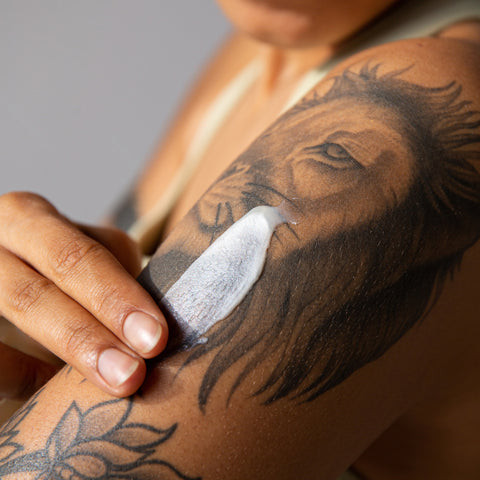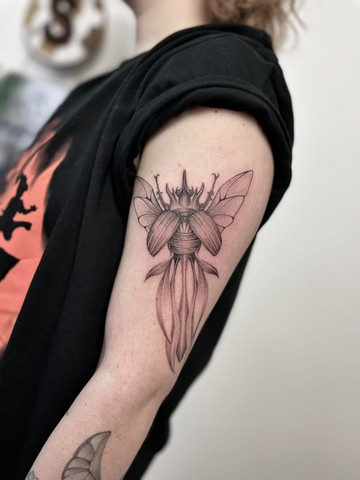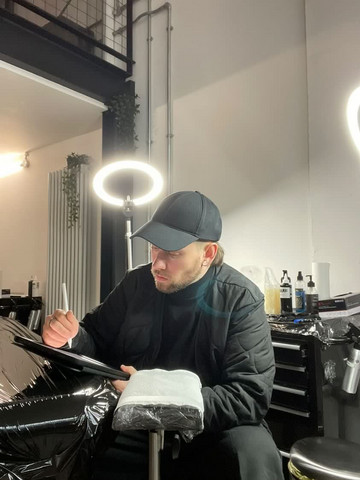Eczema and tattoos can coexist, but understanding how to manage both is crucial for maintaining healthy, vibrant skin art. At tattooat.com, we’re dedicated to providing comprehensive guidance on tattoo aftercare, especially for those with skin conditions like eczema, ensuring your tattoo journey is smooth and successful.
1. Understanding Eczema and Tattoos
Eczema, also known as atopic dermatitis, is a chronic skin condition characterized by dry, itchy, and inflamed skin. Tattoos involve injecting ink into the dermis, the layer of skin beneath the epidermis. While tattoos don’t directly cause eczema, they can trigger flare-ups in individuals prone to the condition.
1.1. Can People with Eczema Get Tattoos?
Yes, people with eczema can get tattoos, but it’s essential to take precautions. Avoid getting a tattoo during an eczema flare-up, as your skin is already inflamed and your immune system is compromised, which can hinder the healing process. According to skincare experts, tattooing during a flare-up can increase the risk of infection and affect the tattoo’s appearance.
- Consult a Dermatologist: Before getting a tattoo, consult a dermatologist or healthcare provider, especially if you have eczema. They can assess your skin condition and provide personalized recommendations.
- Allergy Testing: Consider allergy testing for tattoo inks, as some inks contain allergens that can trigger eczema flare-ups.
- Choose a Reputable Artist: Select a tattoo artist experienced in working with sensitive skin conditions like eczema.
- Avoid Flare-Up Areas: Avoid tattooing areas prone to eczema flare-ups, such as the elbows, knees, and neck.
1.2. Will Getting a Tattoo Make My Eczema Worse?
Tattoos themselves don’t directly worsen eczema, but the tattooing process and certain tattoo inks can trigger flare-ups in susceptible individuals. If you have sensitive skin, be cautious about potential irritants in tattoo inks, aftercare products or external environments.
- Hypoallergenic Inks: Opt for hypoallergenic tattoo inks formulated for sensitive skin to minimize the risk of allergic reactions.
- Skin Test: Perform a skin test with the chosen tattoo ink before getting a full tattoo to check for any adverse reactions.
- Proper Aftercare: Follow a strict aftercare routine to keep the tattooed area clean, moisturized, and protected from infection.
- Avoid Irritants: Steer clear of harsh soaps, fragrances, and other potential irritants that can exacerbate eczema symptoms.
1.3. Can Eczema Affect Tattoos?
Eczema can affect tattoos by causing itching, inflammation, and dryness in the tattooed area. Constant scratching can damage the tattoo and lead to fading or distortion of the design. Eczema primarily affects the epidermis, while tattoo ink resides in the dermis. However, inflammation from eczema can impact the overall appearance and healing of a tattoo.
- Itch-Free Healing: Prevent scratching at all costs during the healing process to avoid damaging the tattoo and increasing the risk of infection.
- Moisturization: Keep the tattooed area well-moisturized with a gentle, fragrance-free moisturizer to prevent dryness and itching.
- Avoid Over-Moisturizing: Be cautious not to over-moisturize, as this can trap moisture and create a breeding ground for bacteria.
- Sun Protection: Protect the tattoo from sun exposure, as UV rays can fade the ink and worsen eczema symptoms.
1.4. Can Eczema Ruin a Tattoo?
While eczema itself may not completely ruin a tattoo, it can compromise the tattoo’s appearance and longevity. Flare-ups can cause inflammation, itching, and dryness, leading to scratching and potential damage to the tattoo. With proper care and management, people with eczema can still enjoy beautiful tattoos.
- Gentle Cleansing: Cleanse the tattooed area gently with a mild, fragrance-free cleanser to remove dirt and bacteria without irritating the skin.
- Lukewarm Water: Avoid hot water, as it can dry out the skin and worsen eczema symptoms.
- Pat Dry: Pat the tattooed area dry with a soft towel instead of rubbing to minimize friction and irritation.
- Loose Clothing: Wear loose-fitting clothing over the tattoo to prevent rubbing and irritation.
2. Using Eczema Cream on Tattoos
Managing eczema on a tattoo requires a delicate balance to avoid irritating the skin while promoting healing. Understanding which products are safe and effective is crucial.
2.1. Can I Put Eczema Cream on My Tattoo?
Yes, you can use eczema cream on an existing tattoo, but it’s essential to choose the right product and apply it correctly. For new tattoos, it’s best to avoid certain products that can prolong healing. Common eczema creams like Cetaphil are generally safe to use on new tattoos. However, products like Vaseline, E45, Neosporin, and CeraVe, which contain skin barriers like bacitracin, neomycin, and polymyxin, can trap moisture and prevent air exposure, potentially hindering the healing process.
- Choose the Right Cream: Select an eczema cream that is fragrance-free, hypoallergenic, and non-comedogenic to avoid irritating the skin and clogging pores.
- Consult Your Artist: Consult your tattoo artist or dermatologist before using any new products on your tattoo, especially if it’s still healing.
- Patch Test: Perform a patch test on a small area of the tattoo before applying the cream to the entire area to check for any adverse reactions.
- Thin Layer: Apply a thin layer of eczema cream to the tattooed area to avoid over-moisturizing and trapping moisture.
 Tattoo moisturiser
Tattoo moisturiser
2.2. When to Use Eczema Cream on a Tattoo
Eczema cream can be used on a tattoo when you experience eczema symptoms like itching, dryness, or inflammation. It’s essential to address these symptoms promptly to prevent scratching and further damage to the tattoo. If your tattoo is fully healed and you experience an eczema flare-up in the area, it’s generally safe to use your regular eczema treatment.
- Flare-Up Symptoms: Apply eczema cream as soon as you notice any signs of an eczema flare-up on or around the tattoo.
- Nighttime Application: Consider applying eczema cream at night before bed to allow it to absorb into the skin while you sleep.
- After Showering: Apply eczema cream after showering or bathing to lock in moisture and prevent dryness.
- As Needed: Reapply eczema cream as needed throughout the day, especially if you experience dryness or itching.
2.3. How to Apply Eczema Cream on a Tattoo
Applying eczema cream on a tattoo requires a gentle touch and attention to detail. Follow these steps for safe and effective application:
- Wash Your Hands: Wash your hands thoroughly with soap and water before applying any product to your tattoo.
- Clean the Tattoo: Gently clean the tattooed area with a mild, fragrance-free cleanser and lukewarm water.
- Pat Dry: Pat the tattoo dry with a soft towel instead of rubbing.
- Apply a Thin Layer: Apply a thin layer of eczema cream to the tattooed area, using your fingertips or a cotton swab.
- Gently Massage: Gently massage the cream into the skin until it is fully absorbed.
- Avoid Over-Application: Avoid applying too much cream, as this can trap moisture and lead to infection.
2.4. Ingredients to Avoid in Eczema Creams for Tattoos
When choosing an eczema cream for your tattoo, it’s essential to avoid certain ingredients that can irritate the skin or interfere with the healing process:
- Fragrances: Fragrances can cause allergic reactions and irritate sensitive skin.
- Alcohol: Alcohol can dry out the skin and delay healing.
- Dyes: Dyes can cause allergic reactions and stain the tattoo.
- Lanolin: Lanolin is a common allergen that can trigger eczema flare-ups.
- Parabens: Parabens are preservatives that can irritate the skin.
2.5. Recommended Eczema Creams for Tattoos
Here are some recommended eczema creams that are generally safe to use on tattoos:
| Eczema Cream | Key Ingredients | Benefits |
|---|---|---|
| Cetaphil Moisturizing Cream | Glycerin, Petrolatum, Dimethicone | Non-greasy, fragrance-free, and provides long-lasting hydration. |
| Eucerin Eczema Relief Cream | Colloidal Oatmeal, Ceramide-3, Licochalcone | Clinically proven to relieve itching and irritation associated with eczema. |
| Aveeno Eczema Therapy Daily Moisturizing Cream | Colloidal Oatmeal, Ceramides | Soothes and moisturizes dry, itchy skin while helping to strengthen the skin’s natural barrier. |
| Vanicream Moisturizing Cream | Petrolatum, Glycerin, Dimethicone | Free of common irritants like fragrances, dyes, and parabens. |
| CeraVe Moisturizing Cream | Ceramides, Hyaluronic Acid, Glycerin | Helps restore the skin’s natural barrier and provides long-lasting hydration. |
| Aquaphor Healing Ointment | Petrolatum, Lanolin, Glycerin, Panthenol | Protects and soothes dry, cracked, or irritated skin while promoting healing. |
| La Roche-Posay Lipikar Eczema Soothing Relief Cream | Shea Butter, Niacinamide, Glycerin | Provides immediate and long-lasting relief from eczema symptoms while helping to restore the skin’s natural barrier. |
| Dermarest Eczema Relief Cream | Hydrocortisone, Ceramides | Provides temporary relief from itching and inflammation associated with eczema. |
| Neosporin Eczema Essentials Daily Moisturizing Cream | Colloidal Oatmeal, Ceramides | Soothes and moisturizes dry, itchy skin while helping to strengthen the skin’s natural barrier. |
| Gladskin Eczema Cream | Micreobalance | Targets Staphylococcus aureus bacteria, which can contribute to eczema symptoms. |
| Vaseline Intensive Care Eczema Therapy Cream | Colloidal Oatmeal, Petrolatum | Relieves itching and irritation due to eczema and helps to restore the skin’s natural barrier. |
| Curél Itch Defense Calming Lotion | Ceramides, Shea Butter, Eucalyptus Extract | Soothes and moisturizes dry, itchy skin while helping to strengthen the skin’s natural barrier. |
| Gold Bond Eczema Relief Cream | Colloidal Oatmeal, Ceramides | Provides temporary relief from itching and irritation associated with eczema. |
| Bioderma Atoderm Intensive Balm | Glycerin, Mineral Oil, Sunflower Seed Oil | Soothes and moisturizes dry, itchy skin while helping to restore the skin’s natural barrier. |
| Mustela Stelatopia Emollient Cream | Sunflower Oil Distillate, Avocado Perseose | Soothes and moisturizes dry, itchy skin while helping to strengthen the skin’s natural barrier. |
3. Tattooing Over Eczema Scars and Prevention
Understanding the possibilities and precautions when tattooing over eczema scars is essential. Additionally, preventative measures can help minimize the risk of eczema flare-ups.
3.1. Can Tattoos Cause Eczema?
Tattoos cannot directly cause eczema, but they can trigger flare-ups in individuals with a predisposition to the condition. If you have sensitive skin, there’s always a risk of reaction to tattoo ink. Consider tattooing an area less prone to flare-ups.
- Location, Location, Location: Choose a tattoo location that is less prone to eczema flare-ups. Areas like the back, shoulders, or upper arms may be less susceptible than areas like the elbows, knees, or neck.
- Seasonal Timing: If your eczema is seasonal, schedule your tattoo session during a time of year when your skin is less prone to flare-ups.
- Avoid Irritants: Minimize exposure to potential irritants like harsh soaps, fragrances, and allergens.
- Stay Hydrated: Drink plenty of water to keep your skin hydrated from the inside out.
3.2. Can You Tattoo Over Eczema Scars?
Yes, it’s possible to tattoo over eczema scars, but several factors must be considered. According to tattoo artist Sam, the success of tattooing over scars depends on the sensitivity, dexterity, age, and type of the scar.
- Scar Sensitivity: Assess the scar’s sensitivity. Is it numb, or overly sensitive?
- Scar Dexterity: Evaluate the scar’s texture. Is it raised, firm, thin, or delicate?
- Scar Age: Ensure the scar is fully healed for at least 1-2 years before tattooing.
- Tattoo Design: Choose a tattoo design that is appropriate for the scar tissue. Delicate, fine-line tattoos may be less intrusive than thickly lined American Traditional styles.
3.3. Tips for Preventing Eczema Flare-Ups After Getting a Tattoo
Preventing eczema flare-ups after getting a tattoo is essential for preserving the tattoo’s appearance and ensuring your skin’s health:
- Keep the Tattoo Clean and Dry: Gently clean the tattooed area with a mild, fragrance-free cleanser and lukewarm water, and pat it dry with a soft towel.
- Moisturize Regularly: Apply a thin layer of fragrance-free, hypoallergenic moisturizer to the tattooed area several times a day to prevent dryness and itching.
- Avoid Scratching: Resist the urge to scratch the tattoo, as this can damage the skin and increase the risk of infection.
- Protect from Sun Exposure: Protect the tattoo from sun exposure by wearing loose-fitting clothing or applying a broad-spectrum sunscreen with an SPF of 30 or higher.
- Avoid Irritants: Avoid harsh soaps, fragrances, and other potential irritants that can trigger eczema flare-ups.
- Stay Hydrated: Drink plenty of water to keep your skin hydrated from the inside out.
- Manage Stress: Practice stress-reducing activities like yoga, meditation, or deep breathing exercises to help manage eczema flare-ups.
- Follow Aftercare Instructions: Follow your tattoo artist’s aftercare instructions carefully to promote healing and prevent complications.
3.4. Addressing Eczema on Existing Tattoos
If you experience eczema on an existing tattoo, treat it as you would treat eczema on any other part of your body. Use your regular eczema treatment, and consult a dermatologist if your symptoms worsen or don’t improve.
- Topical Corticosteroids: Topical corticosteroids can help reduce inflammation and itching associated with eczema.
- Topical Calcineurin Inhibitors: Topical calcineurin inhibitors like tacrolimus and pimecrolimus can help reduce inflammation without the side effects of corticosteroids.
- Wet Wraps: Wet wraps can help hydrate the skin and reduce inflammation.
- Light Therapy: Light therapy, also known as phototherapy, can help reduce inflammation and itching.
3.5. Incorporating Eczema into Tattoo Designs
Some individuals choose to embrace their eczema and incorporate it into their tattoo designs. This can be a way to accept your skin as part of your identity and create a unique and empowering tattoo.
- Embrace Your Skin: Consider incorporating the speckled, reddish tones of eczema into the color and shading of your tattoo.
- Consult a Tattoo Artist: Work with a tattoo artist who is experienced in creating custom designs that incorporate skin conditions like eczema.
- Find Inspiration: Look for inspiration in nature, art, or other sources to create a tattoo design that celebrates your individuality.
 Arm tattoo by Sam of @mas_tattoos_
Arm tattoo by Sam of @mas_tattoos_
4. Expert Insights and Considerations
Gaining insights from both dermatologists and tattoo artists can provide a well-rounded perspective on managing tattoos and eczema.
4.1. Dermatologist Recommendations
Dermatologists recommend the following for individuals with eczema who are considering getting a tattoo:
- Consult a Dermatologist: Consult a dermatologist before getting a tattoo to assess your skin condition and discuss potential risks and benefits.
- Choose a Reputable Artist: Choose a tattoo artist who is experienced in working with sensitive skin conditions like eczema.
- Avoid Flare-Ups: Avoid getting a tattoo during an eczema flare-up.
- Test Tattoo Ink: Test tattoo ink on a small area of skin before getting a full tattoo to check for allergic reactions.
- Follow Aftercare Instructions: Follow your tattoo artist’s aftercare instructions carefully.
- Moisturize Regularly: Moisturize your skin regularly with a fragrance-free, hypoallergenic moisturizer.
- Avoid Irritants: Avoid harsh soaps, fragrances, and other potential irritants.
- Protect from Sun Exposure: Protect your tattoo from sun exposure.
4.2. Tattoo Artist Perspectives
Tattoo artists with experience in working with clients with eczema offer the following advice:
- Communicate Openly: Communicate openly with your tattoo artist about your eczema and any concerns you may have.
- Choose the Right Design: Choose a tattoo design that is appropriate for your skin condition.
- Be Patient: Be patient with the healing process, as it may take longer for tattoos to heal on skin with eczema.
- Follow Aftercare Instructions: Follow your tattoo artist’s aftercare instructions carefully.
- Stay Hydrated: Stay hydrated by drinking plenty of water.
- Avoid Scratching: Avoid scratching the tattoo, as this can damage the skin and increase the risk of infection.
4.3. The Importance of Patch Testing
Patch testing is crucial for individuals with eczema who are considering getting a tattoo. Patch testing involves applying a small amount of tattoo ink to a small area of skin and monitoring for any allergic reactions.
- Identify Allergens: Patch testing can help identify potential allergens in tattoo inks.
- Prevent Allergic Reactions: Patch testing can help prevent severe allergic reactions to tattoo inks.
- Minimize Risk: Patch testing can minimize the risk of complications after getting a tattoo.
4.4. Long-Term Tattoo Care for Eczema Sufferers
Long-term tattoo care is essential for preserving the appearance of your tattoo and ensuring the health of your skin.
- Moisturize Regularly: Moisturize your skin regularly with a fragrance-free, hypoallergenic moisturizer.
- Avoid Irritants: Avoid harsh soaps, fragrances, and other potential irritants.
- Protect from Sun Exposure: Protect your tattoo from sun exposure.
- Stay Hydrated: Stay hydrated by drinking plenty of water.
- Manage Stress: Manage stress to prevent eczema flare-ups.
- See a Dermatologist: See a dermatologist regularly for checkups and treatment of eczema.
4.5. When to Seek Professional Medical Advice
Seek professional medical advice if you experience any of the following after getting a tattoo:
- Signs of Infection: Signs of infection, such as redness, swelling, pain, or pus.
- Allergic Reaction: Allergic reaction, such as rash, itching, or hives.
- Eczema Flare-Up: Severe eczema flare-up that doesn’t respond to treatment.
- Changes in Tattoo Appearance: Changes in the appearance of your tattoo, such as fading, distortion, or raised areas.
 Sam of @mas_tattoos_
Sam of @mas_tattoos_
5. Summary: Navigating Tattoos and Eczema
Managing tattoos and eczema requires careful planning, diligent aftercare, and ongoing maintenance. By understanding the potential risks and benefits, choosing the right products, and following expert recommendations, you can enjoy beautiful tattoos while keeping your skin healthy and happy. Remember, it’s always best to consult with a dermatologist or healthcare provider for personalized advice and treatment.
6. Frequently Asked Questions (FAQs)
6.1. Is it safe to get a tattoo if I have eczema?
Yes, but it’s crucial to avoid tattooing during flare-ups and consult a dermatologist beforehand.
6.2. Can tattoo ink trigger an eczema flare-up?
Yes, certain tattoo inks can trigger flare-ups in individuals with sensitive skin.
6.3. What type of tattoo ink is best for people with eczema?
Hypoallergenic tattoo inks are generally recommended to minimize the risk of allergic reactions.
6.4. How should I care for my tattoo if I have eczema?
Follow a strict aftercare routine, including gentle cleansing, moisturizing, and avoiding irritants.
6.5. Can I use my regular eczema cream on my tattoo?
Yes, but it’s essential to choose a fragrance-free, hypoallergenic cream and apply it in a thin layer.
6.6. What ingredients should I avoid in eczema creams for tattoos?
Avoid fragrances, alcohol, dyes, lanolin, and parabens.
6.7. Can I tattoo over eczema scars?
Yes, but it depends on the scar’s sensitivity, texture, age, and the tattoo design.
6.8. How can I prevent eczema flare-ups after getting a tattoo?
Keep the tattoo clean and dry, moisturize regularly, avoid scratching, and protect it from sun exposure.
6.9. What should I do if I experience an eczema flare-up on my tattoo?
Treat it as you would treat eczema on any other part of your body and consult a dermatologist if symptoms worsen.
6.10. When should I seek professional medical advice after getting a tattoo?
Seek medical advice for signs of infection, allergic reaction, severe eczema flare-up, or changes in tattoo appearance.
7. Discover Your Perfect Tattoo Journey with tattooat.com
Ready to explore the world of tattoos with confidence, even with eczema? Visit tattooat.com to discover a wealth of resources, including:
- Extensive Tattoo Design Gallery: Browse thousands of unique tattoo designs to find the perfect inspiration for your next piece of body art.
- Top Tattoo Artists and Studios: Connect with talented tattoo artists and reputable studios in the USA, ensuring a safe and professional tattooing experience.
- Comprehensive Tattoo Guides: Access in-depth articles and guides on tattoo aftercare, tattoo styles, and more, empowering you to make informed decisions about your tattoo journey.
Address: 1825 SW Broadway, Portland, OR 97201, United States
Phone: +1 (503) 725-3000
Website: tattooat.com
Take the first step towards your dream tattoo today!
